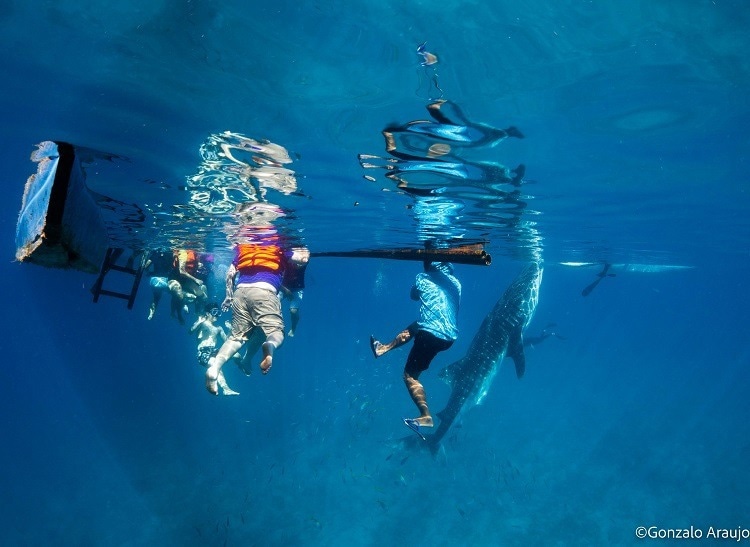Increasing opportunities for up-close encounters with sharks and other animals are making wildlife tourism one of the fastest growing tourism sectors – leading Australian ecology experts to venture to one of the world’s main sites to investigate the effects of tourism on endangered whale sharks.

Image Credit: Dr Gonzalo Araujo
At Oslob in the Philippines, Flinders University’s Southern Shark Ecology Group and Global Ecology Lab joined local Filipino researchers to measure how the daily feeding regimes for resident whale shark population might have affected their behaviour and physiology by assessing their activity and metabolic requirements.
Oslob is home to one of the world’s largest whale shark (Rhincodon typus) tourism sites, and operators use 150 kg to 400 kg of food to attract the impressive animals to the picturesque location.
In the 12 years since feeding whale sharks began, mass tourism at the location has increased the size of shark aggregation as well as changed shark behaviour, including ‘desensitisation’ to boat and human contact.
“By fitting 16 whale sharks with small accelerometers, similar to a fitness tracker, we found their daily movements and resulting metabolic rate increased by up to 55% in response to their quest for food at the tourism site,” says Flinders University Honours researcher Christine Barry, who is now doing a PhD at Murdoch University, WA.
“Our bioenergetics model suggests that providing about 220 kg of food per day would be sufficient to offset higher metabolic rate driven by tourism.
“However, the unknown long-term consequences of feeding whale sharks suggests that managers should focus on making changes to operating procedures to reduce the high activity we see at the site.”
Supported by the Harry Butler Institute at Murdoch University and the Australian Institute of Marine Science, Ms Barry hopes her current PhD project will support management at West Australia’s Ningaloo Reef by measuring the importance of foraging ground for this vulnerable species.
The Oslob study and data analysis were supported by Dr Adrian Gleiss from the Harry Butler Institute and Flinders University Professor Corey Bradshaw, who both contributed to the article just published in the journal Biological Conversation.
Senior author Flinders University Professor Charlie Huveneers, Research Director of the Southern Shark Ecology Group, says the two-fold increase in whale shark activity was due to more rapid acceleration and altered tailbeat frequency and amplitude required by the sharks to move between and avoid each other and boats.
While wildlife tourism has many benefits, including educational and conservation opportunities, we need to be mindful of a range of possible negative effects on the movement and activity of the animals targeted by tourism.
Without adequate management and regulation, tourism could have a range of negative effects on whale sharks and their ecosystems, and therefore the industry relying on these whale sharks."
Professor Charlie Huveneers, Senior Author, Flinders University
Ms Barry says whale shark tourism at Oslob is vital for international tourism and the local economy, and therefore understanding how to ensure sustainable practices is important.
“Feeding whale sharks is becoming an increasingly common strategy for tourism in the Indo-Pacific region, so it is essential to continue investigating how this might be affecting the endangered whale shark,” she says.
Seeking insights into the long-term effects of whale shark feeding practices
Video Credit: Dr Gonzalo Araujo